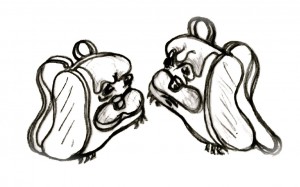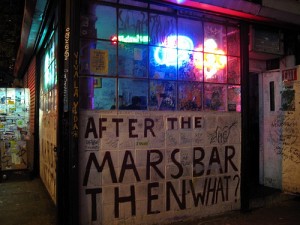Soon there’ll be nowhere left in the world to run to, no place to hide.
 In response to something I posted on neural parasites some time ago — “Fable with parasites I: Bravery lies in the brain of the beholder” — Steve Hyde said this: “Reminds me of those tourists that have been taken over by their backpacks … [Like the chickens in your post], they’re … known to fearlessly approach dangerous beasts.” I believe he was referring to the way intrepid travelers tend to march right up to rogue elephants, e.g., and shoot them in the face with a flash camera. (Word to the wise: Don’t follow this procedure with any elephants, roguish or otherwise.)
In response to something I posted on neural parasites some time ago — “Fable with parasites I: Bravery lies in the brain of the beholder” — Steve Hyde said this: “Reminds me of those tourists that have been taken over by their backpacks … [Like the chickens in your post], they’re … known to fearlessly approach dangerous beasts.” I believe he was referring to the way intrepid travelers tend to march right up to rogue elephants, e.g., and shoot them in the face with a flash camera. (Word to the wise: Don’t follow this procedure with any elephants, roguish or otherwise.)
Anyway, parasitical backpacks struck me as a worthy hypothesis. And it led me to realize that these same backpackers could well be afflicted with yet another parasite, a scourge of the late 20th and early 21st centuries. I refer to the Lonely Planet guides.
These ubiquitous items infect innocent folk sitting in armchairs at home with the idea they must go out and — antlike, maybe even zombie-like — journey paths well-worn by others similarly afflicted and, in doing so, reinforce the power of the book, contributing to its further proliferation.
But these tourists are merely vectors for the spread of the parasites. Their real hosts are the lands and cities they describe. These host destinations soon become debilitated, of course, drained of color and life, so the books must keep mutating, infecting ever further shores, finding new hosts at the same time they recruit new vectors with promise of far-flung havens with Internet connections and cheap cottage cheese.
Scary? Take heart. Virtual realities will soon instead have the adventurous masses globetrotting without the need to leave their armchairs, sparing what’s left of our natural environment their predations. (For more on this, see “Qubital worlds save pyramids from erosion by camel crap.”)
By that time, however, our own internal environments might be unrecognizable to us the way we are now. For more on that, wait for the publication of Syn, my new science-fiction novel.
Meanwhile, have a look at some brilliant photos of mountain biking on Mars. And for an après-biking drink, there’s the Mars Bar.
More news re. neural parasites (you read it here first):
“Fable with parasites II: Owl of Minerva flies at the turn of the worm“, “Who’s driving the bus: Parasites rool, OK!”, and “Actual physical manifestation of a meme: First confirmed sighting in the wild.”
Note. There’s reason to believe that print species of parasitical Lonely Planet books, in face of digital publishing, may already be threatened with extinction.

Hey, let’s not diss Lonely Planet. I could have used a Lonely Planet guide when I was schlepping around India in the late 1960s-early 1970s. It is true that lemming tourism, as I call it, seems to be the norm. But anybody who wants to can get away from that just by buying a map of the country hesheorit is in and picking some remote village and getting a bus there, if you can manage that without knowing the local language.
Of course, once you get there, you’ll find that there’s nothing there and nothing to do and nobody speaks English. Otherwise it would have been written up in Lonely Planet. Ha ha! Something to think about.
Doesn’t matter. As soon as a prospective destination makes cottage cheese readily available and, more recently, as long as their are sufficient Internet cafe umbilical cords to the travelers’ home countries, the dreaded L.P. parasite arrives aboard the zombie-like hordes who know no better.
Not everyone is cut out for adventure, and while they exasperate me, I still think there’s value in their seeing something of the world. “I admire explorers, but I like mapmakers better, as they encourage the timid,” said someone forgotten to me and apparently never known to Google. That’s how I feel about LP.
That being said, I was annoyed as fuck to go looking for the cove in southern Turkey that my family used to frequent, and where we felt intruded on if there was anyone else there aside from the camel drivers who would bring the animals down at sunset for a sand bath, only to find that every cove in the area was so choked by 8-story pansiyons that I could no longer identify just which cove was “ours.”
A wonderfully apropos quote. I can’t find the author either. Maybe it’s you.
I’ve always liked traveling to exotic places in a state of abject ignorance. Maybe this remark points to part of the reason:
“The map? I will first make it.”
― Patrick White, *Voss*
I encountered the following quote only because Google found “map” in it, and I include it because I remember the impact the passage had on me when I read Cormac McCarthy’s *The Road*:
“Once there were brook trout in the streams in the mountains. You could see them standing in the amber current where the white edges of their fins wimpled softly in the flow. They smelled of moss in your hand. Polished and muscular and torsional. On their backs were vermiculate patterns that were maps of the world in its becoming. Maps and mazes. Of a thing which could not be put back. Not be made right again. In the deep glens where they lived all things were older than man and they hummed of mystery.”
Easily the most-quoted “mapmaker” passage online is William Burroughs: “In my writing I am acting as a map maker, an explorer of psychic areas … a cosmonaut of inner space, and I see no point in exploring areas that have already been thoroughly surveyed.”
So everybody loves this idea, and then they head out on the highway piloted by their Lonely Planet neural parasites to explore areas so thoroughly surveyed that the only way they suspect it’s Khao San Road rather than Tamel or Kuta Beach is because they have to pay for their cottage cheese in Thai baht. 🙂 Possibly I exaggerate.
Besides which, I rarely seem to get farther afield than Villa Supermarket, these days, though it is true that the staff fuck with my head from time to time by moving everything around, maybe locating sencha tea between the polenta and the toothpaste. Again, I exaggerate for effect, but only slightly.